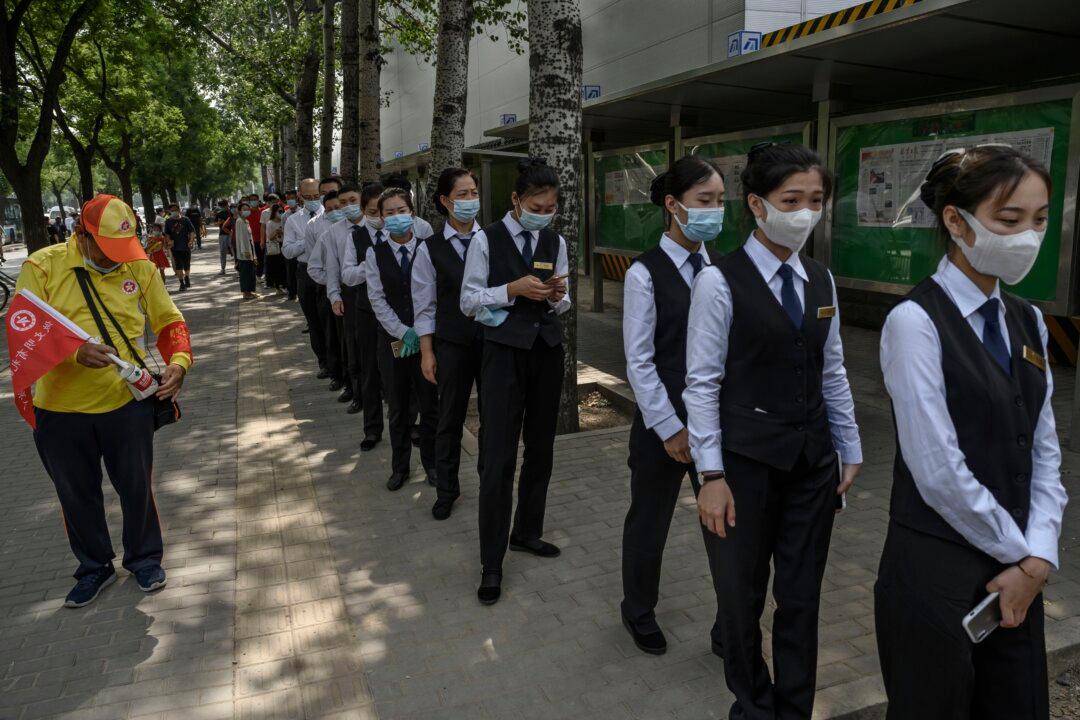At least four drug manufacturers in China are developing vaccines for COVID-19, the disease caused by the CCP virus.
On the packaging of the vaccine manufactured by Sinovac, it states clearly that the vaccine has not been approved by China’s National Medical Products Administration (NMPA), the state agency that regulates the manufacturing of drugs, medical devices, cosmetics, and so on.
But a Chinese state-run company has mandated that some of its employees take part in Sinovac vaccine trials, according to an internal document that The Epoch Times obtained.“Taking these [unapproved] vaccines is risky. The vaccine might not work. The worst-case scenario is that it may infect people with the Wuhan pneumonia [CCP virus],” said Chan King-ming, director of the Environmental Science Program at the Chinese University of Hong Kong and member of U.S. Society of Toxicology.
Chan told the Chinese-language Epoch Times that it typically takes about one year to develop and test a vaccine. After lab and animal tests, a vaccine needs to be tested in three phases during clinical trials. After evaluating the vaccine’s safety and effectiveness and confirming there’s no safety concerns, the state administration can approve a vaccine.
“I want to ask: The vaccine isn’t approved. Who will take responsibility for the vaccine’s safety?” Chan said.
In the United States, drug companies have begun clinical trials with testing on human volunteers.
Beijing-based biopharmaceutical company Sinovac Biotech, which is a joint venture between a private Hong Kong company and the state-run Sinobioway, developed and manufactured CoronaVac, an inactivated vaccine candidate.
An internal document dated June 15 issued by TravelSky Technology, a state-run company that develops technology for air travel information, showed that the company requested seven groups of its employees to take the Sinovac-manufactured CoronaVac.
TravelSky counts airlines, airports, air travel agencies, and air cargo services as its clients. As of December 2019, TravelSky had 7,476 employees, according to the company’s 2019 annual report.
TravelSky said in the document leaked to The Epoch Times by a trusted source: “The vaccine has very good safety and effectiveness, and is ready to be applied to people in the case of an emergency.”
Though the document states that employees can “voluntarily” take the vaccine, it is customary of Chinese company culture to use such language to describe mandatory policies. For example, Beijing authorities have said restaurant staff can choose whether to take a nucleic acid test for COVID-19. But if staff cannot show their test results to authorities, they are not allowed to work.The seven groups are: employees in “key and core positions”; employees who work in airport terminals; employees who need to take an overseas business trip in the near future or take domestic business trips frequently; managers and staff who attend meetings frequently; employees who are assigned to virus-prevention tasks; and other employees who would like to test the vaccine.
Zhang Hua (pseudonym), a health official from a provincial Center for Disease Control and Prevention (CDC), told the Chinese-language Epoch Times by phone that at present, participating in a clinical trial should be voluntary.
TravelSky asking its employees to take CoronaVac is essentially forcing them to take part in a clinical trial, Zhang said. “It’s not right that TravelSky didn’t tell its employees the truth.”
Zhang added that the state regulator, NMPA, would typically seek out volunteers for a trial on the broader public after a company succeeds with its clinical trials.
TravelSky has not responded to a request for comment.Other drug manufacturers in China who are working on a COVID-19 vaccine include CanSino Biologics, which has finished the first two phases of clinical trials on its Ad5-nCoV vaccine, according to local media Caixin. China’s Central Military Commission has approved for military soldiers to take part in trials for the vaccine.
State-run Wuhan Institute of Biological Products also developed its vaccine and said that in its Phase II clinical trial, all participants developed antibodies to the virus, according to state-run media Xinhua.
Also, the state-run Institute of Microbiology Chinese Academy of Sciences teamed up with private company Anhui Zhifei Longkema Biopharmaceutical to develop their vaccine. On June 24, the two firms announced that their vaccine was approved to perform Phase I of their clinical trial.
All four vaccines have not yet completed their final clinical trials.





